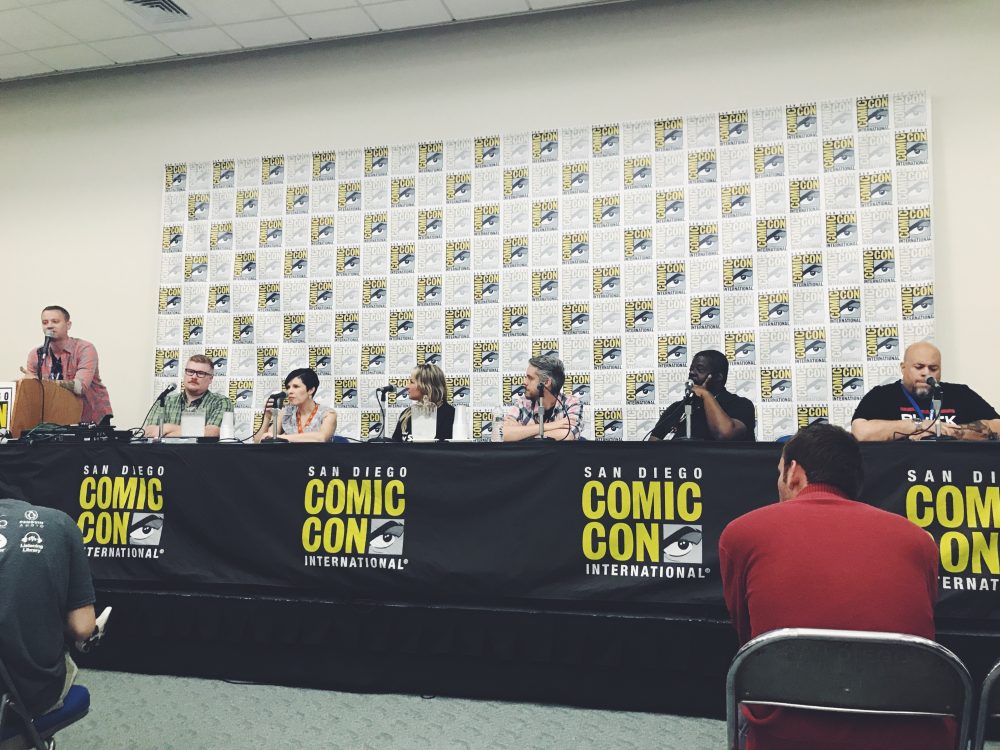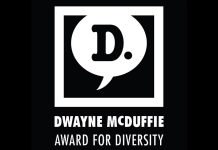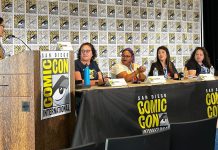By Andrea Ayres
At Comic-Con there’s been a great deal of discussion about how to increase diversity among creators and artists but what about within the marketplace itself? That’s what a number of panelists, assembled by Lion Forge comics, sought to unravel the morning of July 23.
From L-R : Jeremy Atkins (Publicist, Lion Forge) Andrew Woodrow-Butcher (Children’s Bookseller) Jennifer Haines (Owner, The Dragon), Sara Weir (National Down Syndrome Society), David Booher (Powerless), Jim Killen (Buyer, Barnes and Noble), David F. Walker (Superb)
Having both the business and creative side of the comic industry represented helped make for an interesting discussion. Is there really a lack of interest in diverse comics and comic book creators, or is the culprit something else? For Barnes and Noble buyer Jim Kellen, the issue has never been a lack of interest. “The audience has always been there, but they haven’t had anything that speaks to them personally. The moment that happens, they come out and they support it.”
There’s still an enormous void of stories out there, in pop-culture and in comics, that represent women, people of color, and individuals of varying ability levels. That’s part of what has made working on the comic Superb so exciting for Sara Weir of the National Down Syndrome Society (NDSS).
Superb is part of Lion Forge’s Catalyst Prime universe and tells the story of Jonah. Jonah is a superhero who also happens to have Down Syndrome.
According to the NDSS, Down Syndrome is the most commonly occurring chromosomal condition in the United States. Weir and the NDSS have partnered with Lion Forge comics to ensure the depiction of Jonah is authentic and accurate. Getting it right is something the writer of the comic, David F. Walker has spent a great deal of time thinking about.
Walker says he jumped at the chance to write Jonah in part because of an experience he had years ago. Teaching a storytelling workshop for young people experiencing grief, Walker was partnered with a girl with autism. He had been told that she was mostly nonverbal and having never been around anyone with autism before, Walker admits he was terrified. By the end of the workshop, however, he and the young girl had formed a bond. That experience is one he has called upon writing the character of Jonah, “I didn’t want this to just be lip service.”
Moderator Jeremy Atkins, whose mother was an occupational therapist, talked about how being around people with different abilities was part of how he grew up. “She would actually invite her patients to my birthday parties.” Adding, “it was kind of this incredible and unique experience for me.”
That element of making the unfamiliar more familiar is an important component of including characters of different backgrounds and abilities. Accomplishing this involves creating fully realized characters and stories. The fact a character is gay, or black, or differently abled should not be the aspect of their humanity that defines them, but simply an element of their experience. David Booher’s spoke to this when he talked about the introduction of a gay character into the series Powerless (Vault). The characters preference is revealed over several issues as the character goes about living her life, which Booher’s says is much more reflective of reality.
As the owner of a comic book store, Jennifer Haines touched on an important issue regarding the treatment of patrons at comic book stores. Haines says that the market is there, the audience is there, but what is perhaps lagging behind are the store owners. These owners may not know their patrons are interested in reading more inclusive stories or presume their patrons do not care. To remedy this, Haines suggests readers go into comic book stores and ask for more diverse and inclusive content and material.
As someone who partners with teachers and teacher librarians, Andrew Woodrow-Butcher wonders if the material is as readily available as others have suggested. Often, Woodrow-Butcher notes, the material being asked for doesn’t even exist yet. “It’s a systemic problem, it’s publishers and booksellers.” Part of how these panelists believe the industry can change is through consistent and concerted efforts to challenge antiquated business practices and attitudes.
If there was an overarching theme to this discussion it would likely be summed up in Walker’s view of how he sees himself as a writer. “My job is to be creative, and my second job is to give back humanity to people who have been dehumanized and that is far too many of us.”
The hope these panelists expressed is for comics to reflect the unique universe we already see around us. To have characters who are fully realized, with flaws and challenges they must overcome and learn to cope with. Characters who possess their own hopes, dreams and agency and are not merely defined by one or two characteristics.










Comments are closed.